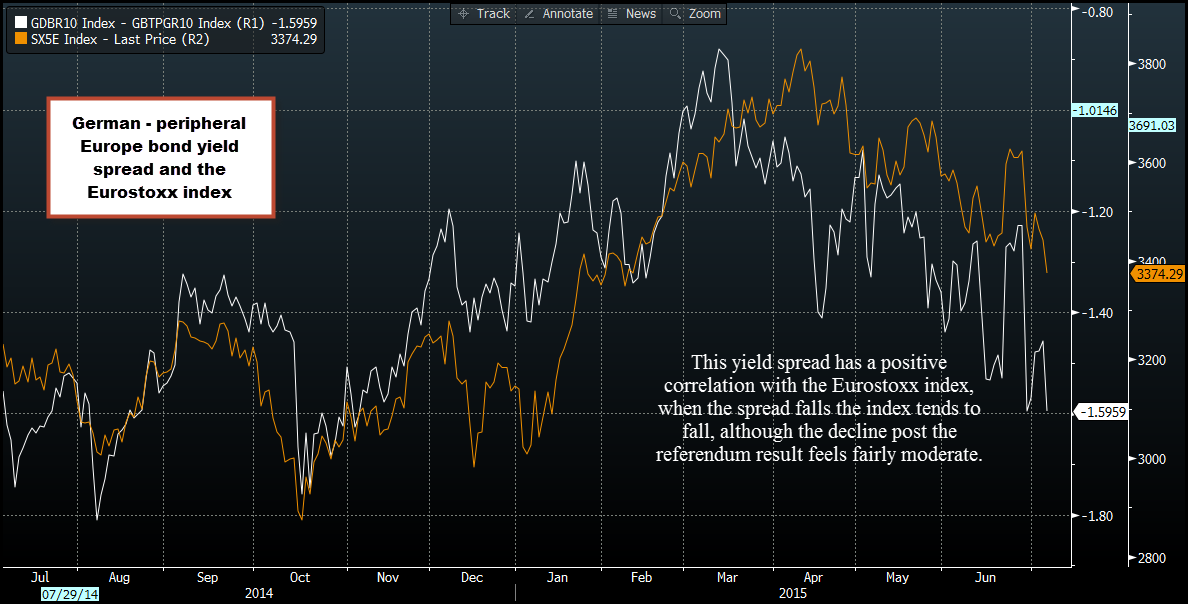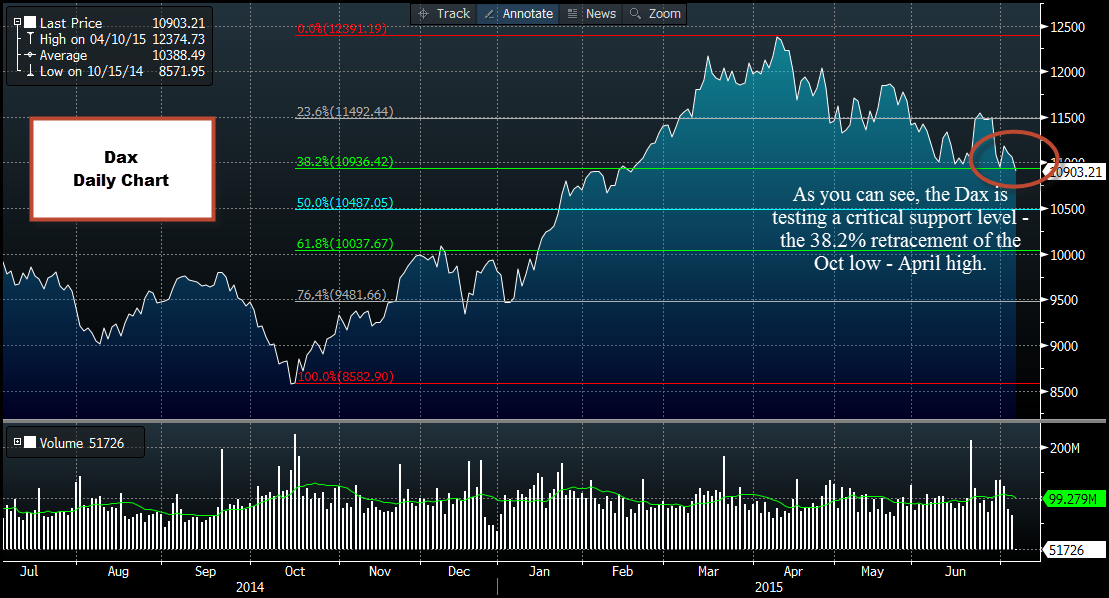![]()
After the Greeks voted No in Sunday’s referendum the focus has shifted to what happens next. Will its banks collapse? Will it have to leave the Eurozone? These are the two most pressing questions for investors. As you have probably heard, the markets are remarkably calm. Stocks are trying to recoup earlier losses, while EURUSD volatility is lower than it was during last month’s peak.
As we mentioned on Sunday evening, the market reaction has been less severe than last week when capital controls were first announced. The relative stability may be down to a few of things: 1, investors’ are still hopeful that a deal can be reached to save Greece, 2, if no deal is reached then the European authorities will give Greece the help it needs to leave the Eurozone gracefully, 3, intervention from global central banks to stem excess volatility in the FX market, and protect the downside for the EUR.
Are markets too optimistic?
We do not think that this calm is truly pricing in the possibility of a messy exit, which could cause a 2012-style surge in volatility in the short-term. But, in the long-term, as ex Fed President Fisher said on TV earlier today, in the end the euro could be stronger without Greece.
Greece in consiliatory mood
For now, we still have to understand the post-referendum stance of all parties. The Greeks look like they could be in conciliatory mood after the resignation of the controversial finance minister. We have heard murmurs of disapproval from the heads of some European institutions, the most threatening comments are emanating from the German finance ministry, which included comments that Bundestag approval will be needed before talks with Greece can resume, and a reiteration that Greece won’t get new aid without conditions.
Merkel to take the lead, ECB in the background…
As we have mentioned in the past, we believe that German Chancellor Merkel’s decision will be the deciding factor. The eerie market quiet today could be the sound of investors’ waiting on the side-lines for the outcome of tomorrow’s European leaders’ summit when Merkel’s position on Greece could be made public. Until then we are still waiting to see how the ECB will react to the Greek referendum result and what it means for the Greek banking sector.
Consensus seems to be forming around three potential paths that the ECB can take:
1, continue to maintain liquidity levels at their current rate, but not turn the taps off completely until more is known about a potential Grexit.
2, The ECB could give a final deadline for ELA funding to the Greek banking sector, regardless of what has been decided by the European authorities.
3, If the ECB wants to play good cop, then it could sit on the side-lines until Athens’ future becomes clear. Once a potential Grexit is announced, the ECB could offer the Greek banking sector a period of grace - say a month or two- where they continue to extend ELA funding giving Greece time to get its banking sector in some sort of order so that it could exit the Eurozone as gracefully as possible.
As you can see, with European officials reluctant to make any hasty decisions about the future of Greece the outcome remains extremely uncertain, however this uncertainty is being translated into inertia rather than panic in financial markets.
The moderate reaction to the latest phase in the Greek saga has implications for stock markets. As we mentioned last week, there is a positive correlation between German and peripheral bond yield spreads and the Eurostoxx index. Although spreads did fall as peripheral bond yields outpaced German yields, the fall was fairly moderate, which is reflected in the moderate decline in the Eurostoxx index (see figure 1).
Where do markets go next?
We continue to think that this situation is EUR negative, and once this potential intervention ceases we could see EURUSD grind down towards 1.05 then towards parity. However, if 1-montnh EURUUSD volatility does not spike above the 15 level then it could be a slow, winding path for EURUSD from here.
Stocks are at a pivotal level. The Dax is currently testing the 38.2% retracement level of the October low – April high. This is an important Fibonacci level, and if we break decisively below here then it would be a very bearish development and also suggest that Europe’s main indices may have seen their highs for the year in April. This is not all down to Greece, volatility in Chinese stocks, which have seen huge price swings in recent days. If the Chinese authorities can’t get the Shanghai Composite index under control then risk sentiment could suffer across the Asia region and further afield.
CFD’s, Options and Forex are leveraged products which can result in losses that exceed your initial deposit. These products may not be suitable for all investors and you should seek independent advice if necessary.
Recommended Content
Editors’ Picks
EUR/USD clings to gains above 1.0750 after US data

EUR/USD manages to hold in positive territory above 1.0750 despite retreating from the fresh multi-week high it set above 1.0800 earlier in the day. The US Dollar struggles to find demand following the weaker-than-expected NFP data.
GBP/USD declines below 1.2550 following NFP-inspired upsurge

GBP/USD struggles to preserve its bullish momentum and trades below 1.2550 in the American session. Earlier in the day, the disappointing April jobs report from the US triggered a USD selloff and allowed the pair to reach multi-week highs above 1.2600.
Gold struggles to hold above $2,300 despite falling US yields

Gold stays on the back foot below $2,300 in the American session on Friday. The benchmark 10-year US Treasury bond yield stays in negative territory below 4.6% after weak US data but the improving risk mood doesn't allow XAU/USD to gain traction.
Bitcoin Weekly Forecast: Should you buy BTC here? Premium

Bitcoin (BTC) price shows signs of a potential reversal but lacks confirmation, which has divided the investor community into two – those who are buying the dips and those who are expecting a further correction.
Week ahead – BoE and RBA decisions headline a calm week

Bank of England meets on Thursday, unlikely to signal rate cuts. Reserve Bank of Australia could maintain a higher-for-longer stance. Elsewhere, Bank of Japan releases summary of opinions.

